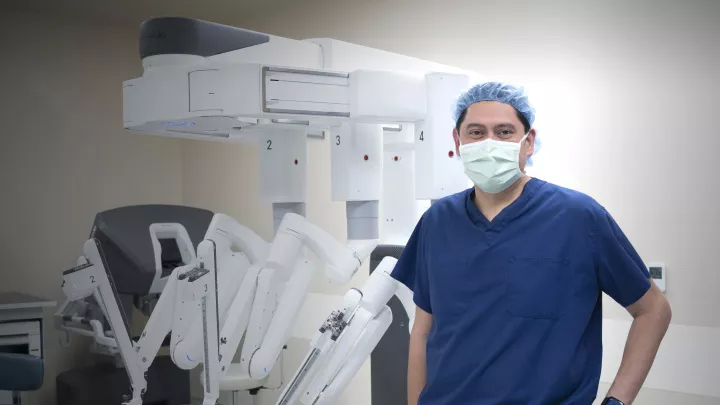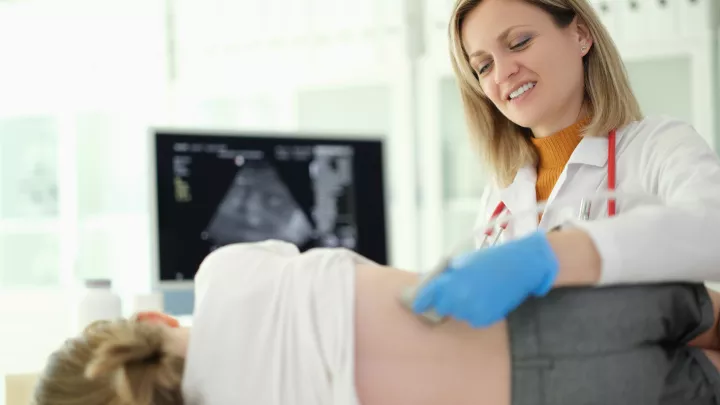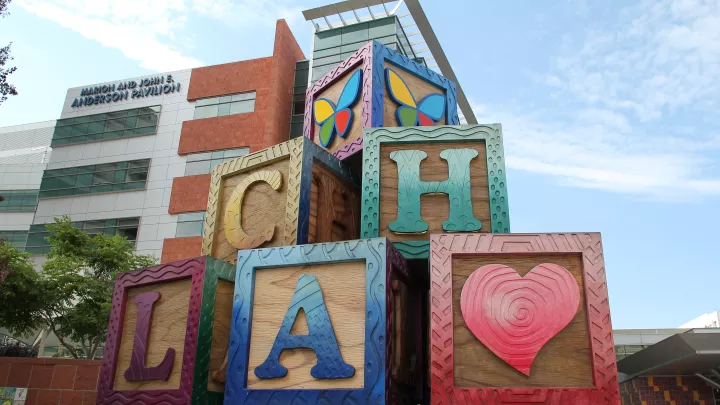Fetal Urology
If your unborn baby has a urology condition, you want the best possible care. And at the Children’s Hospital Los Angeles Division of Urology, you don’t have to wait until your baby is born to get it.
Our fetal urology team diagnoses congenital (present at birth) urology conditions in babies before they’re born. Then, we create a complete care plan for you—so you don’t have to worry about the next steps.
Fetal Urology: Why Choose Us
Our Fetal Urology Program is the largest on the West Coast. In partnership with our nationally ranked Fetal and Neonatal Institute, our pediatric urology experts diagnose genitourinary conditions in fetuses. Genitourinary conditions affect the bladder, kidneys, ureters (tubes that connect the kidneys to the bladder) and external genitalia.
Our families benefit from:
- Early diagnosis and treatment plan: We give you an accurate diagnosis and complete care plan during your pregnancy. Making sure you know what to expect before your baby’s birth leads to less stress and better outcomes. You won’t have to spend time finding doctors or deciding what care your baby needs after delivery.
- Collaborative team: Our families have a team of expert pediatric urologists and perinatologists on their side. They have seen and treated every type of pediatric urology condition. We combine our expertise to ensure all your medical needs are covered. Meet our pediatric Urology team.
- Collaboration with your other providers: Our fetal urology specialists communicate regularly with your delivering obstetrician and your baby’s pediatrician. We work closely with these other doctors to ensure you get seamless care before, during and after your baby’s birth. Parents can be assured that all their doctors are on the same page.
- Counseling and support: We understand that a prenatal diagnosis can be stressful. That’s why our team includes counselors and mental health experts. Our trained staff help expectant parents cope with concerns about pregnancy, birth and how to care for their baby.
- Family education: As an expectant parent, you deserve to be part of your baby’s care plan. Our team provides the information you need to make informed decisions about your delivery and baby’s treatment.
- Convenient access to our specialists: We are one of the few programs in the country to offer a telemedicine fetal urology program. You can get an ultrasound here at CHLA or at your perinatal office of choice. After the ultrasound, you meet with our specialists on-site or through a secure virtual visit on a computer, tablet device or smartphone.
Hydronephrosis Care
Hydronephrosis is the most common diagnosis in fetal urology. Doctors can often detect it when they see kidney swelling in the fetus. A buildup of urine causes this swelling because the kidneys aren’t draining into the bladder.
Hydronephrosis diagnosis
In many cases, our specialists diagnose hydronephrosis during a fetal ultrasound at CHLA. We also see families who received a hydronephrosis diagnosis at their perinatal office. We perform additional ultrasounds when needed, which are safe for you and the fetus.
Hydronephrosis treatment
It’s important to find the underlying cause when treating hydronephrosis. Once we know why the kidneys are swelling, we create a plan for your delivery and baby’s care.
In some cases, hydronephrosis happens because of a birth defect in the kidneys and goes away on its own. Vesicoureteral reflux (VUR) or a blockage in the kidneys, ureters or bladder can also cause this condition.
Our specialists have treated thousands of babies with hydronephrosis. You can be confident that we will recommend the best treatments for you and your baby, which may include antibiotics or surgery.
Other Congenital Urology Conditions We Treat
Our fetal urology team diagnoses all types of congenital genitourinary conditions. After diagnosis, our pediatric urologists talk with you about treatment options and provide counseling when needed. Along with hydronephrosis, some of the conditions we diagnose in a fetus include congenital kidney, bladder, urethra and ureter conditions.
Congenital kidney conditions
Some of the kidney-related congenital conditions we diagnose and treat include:
- Ectopic kidney: The kidney is in an abnormal position.
- Pelvic kidney: The kidney is in the pelvis instead of abdomen.
- Renal agenesis: A baby is born with one kidney instead of two.
- Renal dysplasia: One or both kidneys did not form normally and may not function.
- Renal hypoplasia: One or both kidneys are smaller than average.
- Renal fusion or horseshoe kidney: The kidneys are fused together.
- Polycystic kidney disease (PKD): One or both kidneys have fluid-filled sacs called cysts.
Congenital bladder, urethra and ureter conditions
We diagnose and treat:
- Bladder exstrophy: The bladder forms outside of the body and cannot hold urine.
- Duplex kidneys: The kidney has two ureters instead of one.
- Epispadias: Occurs when the urethra is undeveloped, and urine exits the body at an abnormal location.
- Neurogenic bladder: Spinal or nerve damage causes neurogenic bladder. Children with this condition may not have bladder control.
- Ureteropelvic junction (UPJ) obstruction: Blockage where the ureter attaches to the kidney.
- Ureterovesical junction (UVJ) obstruction: Blockage where the ureter meets the bladder.
- Vesicoureteral reflux (VUR): Backward flow of urine to the kidneys.
Treatment for Congenital Genitourinary Conditions
Whenever possible, we use noninvasive methods or minimally invasive surgery to treat congenital conditions. Some only need “watchful waiting.” This approach means our doctors check your child’s condition regularly to ensure their organs continue to function well.
If your child needs surgery, our surgeons perform minimally invasive and advanced reconstruction techniques to address every type of genitourinary condition.


